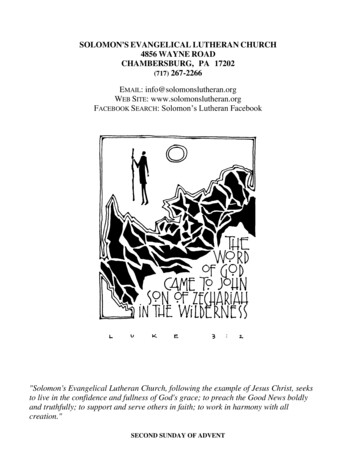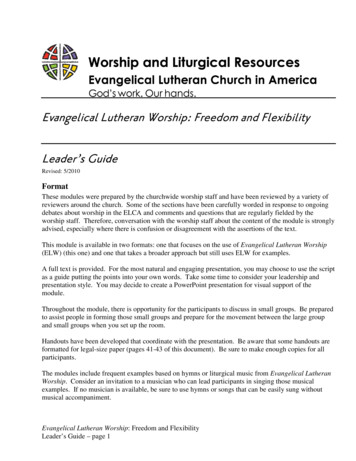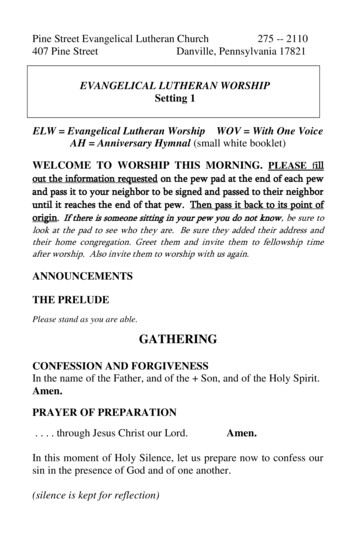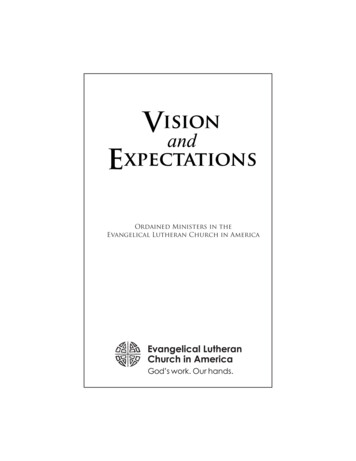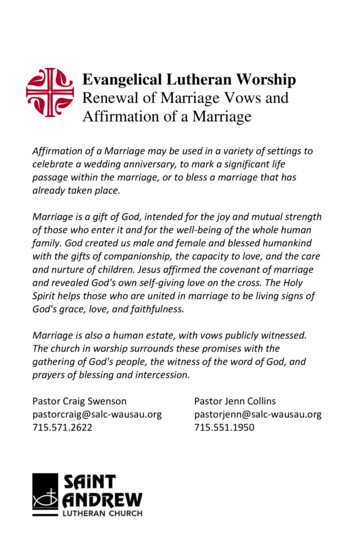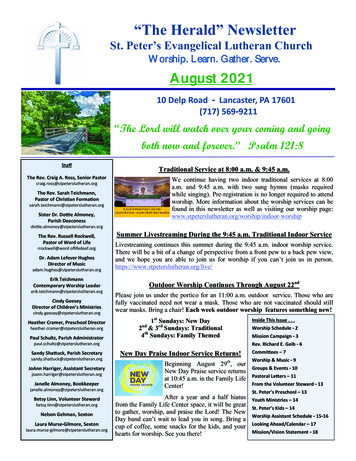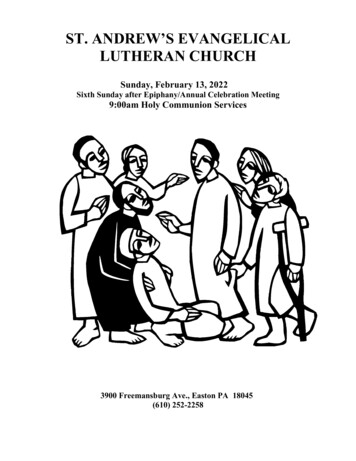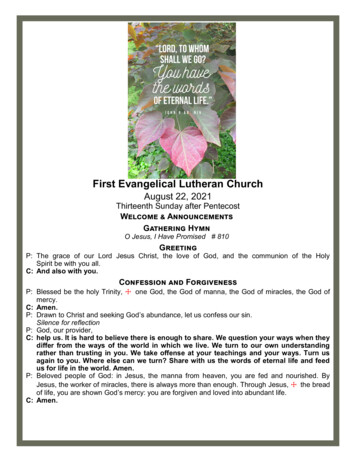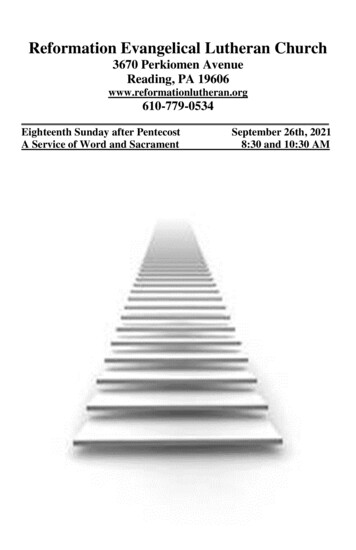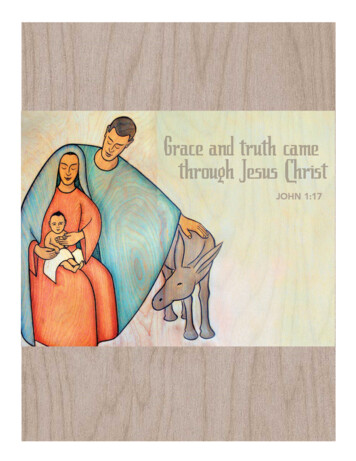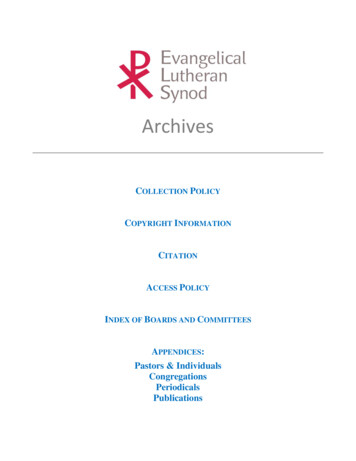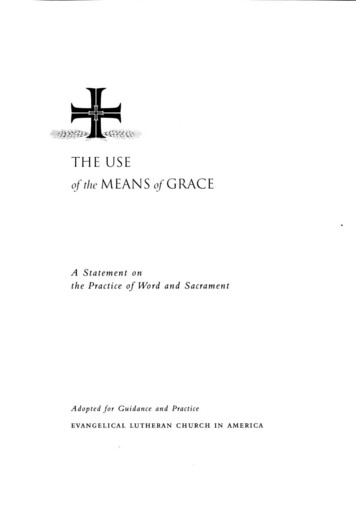
Transcription
THE US Eof the MEANSof GRAC EA Statement o nthe Practice of Word and Sacramen tAdopted for Guidance and Practic eEVANGELICAL LUTHERAN CHURCH IN AMERICA
THE USE OF THE MEANS OF GRAC EA Statement on the Practice of lord attd Sacramen tAdopted for guidance and practice by the Fifth Biennial Churchwide Assembly of the Evangelica lLutheran Church in America, August 19, 1 997.Copyright 1997 Evangelical Lutheran Church in America . All rights reserved . Except for brief quotations in critical articles or reviews, no part of this book may he reproduced in any manner without prio rwritten permission from the publisher or from the other copyright holders . Write to : Permissions,Augsburg Fortress . P.O . Box 1209, Minneapolis. MN SS44 0- 1209 .Also available in Spanish: El Uso de los Medios de Gracia (code 3-3501,ISBN0-8066-37o2-1 )The paper used in this publication meets the minimum requirements of American National Standard fo rInformation Sciences—Permanence of Paper for Printed Materials,ANSI2329 .48-1984 . Th 1Printed in the USA .ISBN0-8066-3648-302 01 00 999 8 973-35 0 012345678910
CONTENT SPREFAC E5The Triune God and the Means of Grac ePART I11Proclamation of the Word and the Christian Assembl yPART 219Holy Baptism and the Christian Assembl yPART 335Holy Communion and the Christian Assembl yPART 455The Means of Grace and Christian Mission6oStudy Helps
PREFAC ETHE TRIUNE GO Dand th eMEANS of G RAC E
THE TRIUNE GO DACTS IN THE MEANS OF GRAC EPrinL ipl ciJesus Christ is the living and abiding Word of God . By the power of th eSpirit, this very Word of God, which is Jesus Christ, is read in the Scriptures ,proclaimed in preaching, announced in the forgiveness of sins, eaten an ddrunk in the Holy Communion, and encountered in the bodily presence o fthe Christian community. By the power of the Spirit active in Hol yBaptism, this Word washes a people to be Christ 's own Body in the world .We have called this gift of Word and Sacrament by the name " the means o fgrace ." The living heart of all these means is the presence of Jesus Christthrough the power of the Spirit as the gift of the Father .Background IA " We believe we have the duty not to neglect any of th erites and ceremonies instituted in Scripture, whatever their number . We donot think it makes much difference if, for purposes of teaching, the enumeration varies, provided what is handed down in Scripture is preserved .For that matter, the Fathers did not always use the same enumeration ." 'Background IB In Christ 's flesh, in his death and resurrection, all peopleare invited to behold and to receive the fullness of God 's grace and truth :-' Apology of the Augsburg Confession,Article xiu . Note : all citations of confessionalmaterial are from the Book of Concord, translated and edited by Theodore G . Tapper t(Philadelphia : Fortress Press, 1 959) .' John6 -THE TRIUNE GOD1 :14-16 .
THE TRIUNE GO DCREATES THE CHURC HPrincipl e2God gives the Word and the sacraments to the Church and by the powe rof the Spirit thereby creates and sustains the Church among us . 3 God establishes the sacraments "to awaken and confirm faith ."4 God calls the Churc hto exercise care and fidelity in its use of the means of grace, so that all peopl emay hear and believe the Gospel of Jesus Christ and be gathered into God' sown mission for the life of the world .Background2AIn a world of yearning, brokenness, and sin, the Church 'sclarity about the Gospel of Jesus Christ is vital . God has promised to com eto all through the means of grace : the Word and the sacraments of Christ' sinstitution . While the Church defines for itself customary practices thatreflect care and fidelity, it is these means of grace that define the Church .Background2BYet even the Church itself is threatened should it fail t oclaim the great treasures of the Gospel . Either careless practice or rigid uniformity may distort the power of the gift . This statement is one way i nwhich we, in the Church, can give counsel to one another, supporting an dsustaining one another in our common mission .Background2CWe are people whose lives are degraded by sin . Thisestrangement from God manifests itself in many ways, including false valuesand a sense of emptiness . Many in our time are deprived or depriving, abusing or abused . All humanity, indeed all creation, is threatened by sin thaterupts in greed, violence, and war. In the midst of isolation, lovelessness, andself-absorption, the Church is tempted to turn in on itself, its own needs ,and preferences . As a church in this time, we seek to give and receive God' sWord and sacraments as full and reliable signs of Christ .3The Small Catechism, The Creed, The Third Article.4Augsburg Confession, Article xni .THE TRIUNE. GOD -7
WHAT IS THE CHURCH ?Primipl c3 "It is also taught among us that one holy Christian church will be an dremain forever.This is the assembly of all believers among whom the Gospe lis preached in its purity and the holy sacraments are administered accordingto the Gospel " sBackground 3A The Evangelical Lutheran Church in America is committed by its statement of purpose to "worship God in proclamation of th eWord and administration of the sacraments and through lives of prayer ,praise, thanksgiving, witness, and service ."6 The Scriptures and ou rConfessions establish this purpose . We believe that "through the Word an dthe sacraments, as through means, the Holy Spirit is given, and the Hol ySpirit produces faith, where and when it pleases God, in those who hear th eGospel ." 75Augsburg Confession, Article vn .6Constitution, Bylaws, and Continuing Resolutions of the Evangelical Lutheran Church inAmerica, 1 995, 4.02 .78 --THE TRIUNE GODAugsburg Confession, Article v .
THIS STATEMENT ENCOURAGE SCHURCH UNITY AMID DIVERSITYPrincipl e4 The gift of Word and Sacrament is from God . This statement on sacra mental practices seeks to encourage unity among us in the administratio nof the means of grace and to foster common understanding and practice . I tdoes not seek to impose uniformity among us .Background 4A This statement grows out of this church's concern forhealthy pastoral action and strong congregational mission . It does no taddress our practice of Word and Sacrament out of antiquarian or legalisti cinterests but rather to ground the practice of our church in the Gospel andto encourage good order within our church .Application 4B Our congregations receive and administer the means o fgrace in richly diverse ways . This diversity in practice is well grounded i nthe Confessions . "It is not necessary for the true unity of the Christia nchurch that ceremonies of human institution should be observed uniforml yin all places ." 8 We are united in one common center : Jesus Christ proclaimedin Word and sacraments amidst participating assemblies of singing, serving ,and praying people .8Augsburg Confession, Article vn .THE TRIUNE GOD -9
PART IPROCLAMATION of the WORDand the CHRISTIAN ASSEMBLY
WHAT IS THE WORD OF GOD ?Principl e5 Jesus Christ is the Word of God incarnate . The proclamation of God'smessage to us is both Law and Gospel .The canonical Scriptures of the Ol dand New Testaments are the written Word of God .9 Through this Word inthese forms, as through the sacraments, God gives faith, forgiveness of sins ,and new life.Application 5A Proclamation of the Word includes the public reading o fScripture, preaching, teaching, the celebration of the sacraments, confessio nand absolution, music, arts, prayers, Christian witness, and service . The con gregation ' s entire educational ministry participates in the proclamation o fthe Word .Constitution, Bylaws, and Continuing Resolutions of the Evangelical Lutheran Church i nAmerica, 2 .02 .9I2- PROCLAMATION OF THE WORD
SUNDAY PROVIDES A DAY FOR ASSEMBL YAROUND WORD AND SACRAMEN TPrincipl e6 Sunday, the day of Christ's resurrection and of the appearances to th edisciples by the crucified and risen Christ, is the primary day on whic hChristians gather to worship . Within this assembly, the Word is read an dpreached and the sacraments are celebrated .Application 6A Sunday is the principal festival day of Christians . "Th eHoly Communion" is one name for the Sunday service of Word andSacrament in which the congregation assembles in Go d 's presence, hears th eword of life, baptizes and remembers Baptism, and celebrates the Hol ySupper .The service of Word and Sacrament is also celebrated on other grea tfestivals of the year, according to the common Christian calendar receive din our churches .The Christian community may gather for proclamation an dthe Lord's Supper at other times as well, as, for example, on other days o fthe week, and when the services of marriage or of the burial of the dea dare placed within the context of the Holy Communion . "10 Lutheran Book of Worship Ministers Edition (Minneapolis : Augsburg PublishingHouse, and Philadelphia : Board of Publication, Lutheran Church in America, 1978) ,3 6 -37 .PROCLAMATION OF THE WORD - I 3
THE SCRIPTURES ARE READ ALOU DPrincipl e7The public reading of the Holy Scriptures is an indispensable part o fworship, constituting the basis for the public proclamation of the Gospel .Application 7A The use of ELCA—approved lectionaries serves the unityof the Church, the hearing of the breadth of the Scriptures, and the evangelical meaning of the church year . The Revised Common Lectionary and th electionaries in Lutheran Book of Worship make three readings and a psalmavailable for every Sunday and festival .Application 7BThe use of a Bible or lectionary of appropriate size an ddignity by those who read the Scriptures aloud, the use of this book in liturgical processions, and its placement on the reading desk or pulpit may brin gthe centrality of the Word to visible expression .THE BAPTIZED PEOPLEPROCLAIM GOD'S WOR DPrincipl e8All the baptized share responsibility for the proclamation of the Wor dand the formation of the Christian assembly.Application 8AOne of the ways lay people exercise the public procla-mation of the Word is as assisting ministers . Among these assisting ministerswill be readers of Scripture and also cantors and leaders of prayer . "Application 8BMusicians serve the assembly by illuminating the readingsand the sacraments, by the congregation's participation in song .Application 8cThere are varieties of ways beyond the assembly i nwhich the public ministry of the Word is exercised . Some of these includethe work of catechists, evangelists, and teachers ." Lutheran Book of Worship Ministers Edition, 25 . See also Principle 41 .14PROCLAMATION OF THE WORD
GOD'S WORD IS PREACHE DPrincipl e9 The preaching of the Gospel of the crucified and risen Christ is roote din the readings of the Scriptures in the assemblies for worship . Called an dordained ministers bear responsibility for the preached Word in the Churc hgathered for public worship .' 2Application 9A Preaching is the living and contemporary voice of on ewho interprets in all the Scriptures the things concerning Jesus Christ .'3 I nfidelity to the readings appointed for the day, the preacher proclaims ou rneed of God's grace and freely offers that grace, equipping the communit yfor mission and service in daily life. " Only under extraordinary circumstances would the sermon be omitted" from the Sunday and festival servic eof Holy Communion .' 4Application 9B While other persons may sometimes preach, the calle dpastor of a congregation has responsibility for this preaching, ordinarilypreparing and delivering the sermon and overseeing all public ministry o fthe Word in the congregation . In congregations without a called pastor, th esynodical bishop assumes this responsibility, often by providing an interi mpastor. All Christians, however, bear responsibility to speak and teach th eGospel in daily life .'2 See Baptism, Eucharist and Ministry. Faith and Order Paper No. 111, (Geneva : WorldCouncil of Churches, 1982), Ministry, 8 ; Augsburg Confession, Article xlv ; also Th eStudy of Ministry Report to the 1991 Assembly : Study Edition (Chicago : EvangelicalLutheran Church in America Division for Ministry, 1991) .'3 Luke 24 :27 .'4Lutheran Book of Worship Ministers Edition,27 .PROCLAMATION OF THE WORD15
THE COMMON VOICE OF THE ASSEMBL YSPEAKS THE WOR DPrincipl eto The assembled congregation participates in proclaiming the Word o fGod with a common voice . It sings hymns and the texts of the liturgy. I tconfesses the Nicene or Apostles' Creed .' sApplication10AHymns, the liturgy, and the creeds are means for th ecommunity itself to proclaim and respond to the Word of God . ' 6 This witnes sshould be valued, taught, and taken to heart . The treasury of music is eve rexpanding with new compositions and with songs from the churches of th eworld .THE ARTS SERVE THE WOR DPrincipl eziMusic, the visual arts, and the environment of our worship space sembody the proclamation of the Word in Lutheran churches .ApplicationHAMusic is a servant of the Gospel and a principal mean sof worshiping God in Lutheran churches . Congregational song gathers th ewhole people to proclaim God's mercy, to worship God, and to pray, i nresponse to the readings of the day and in preparation for the Lord 's Supper.' s The Athanasian Creed is also a confession of the Church, but is rarely used i npublic worship .' 6 Colossians 3 :16 .16PROCLAMATION OF THE WORD
ApplicationIn similar ways the other arts also are called to serve thepurposes of the Christian assembly The visual arts and the spaces for worshi passist the congregation to participate in worship, to focus on the essentials, an dIIBto embody the Gospel .ApplicationI lcIn these times of deeper contact among cultures, ou rcongregations do well to make respectful and hospitable use of the music ,arts, and furnishings of many peoples . The Spirit of God calls people fro mevery nation, all tribes, peoples, and languages to gather around the Gospe lof Jesus Christ .' 7CONFESSION AND ABSOLUTIO NPROCLAIM THE WOR DPrincipl e12The Gospel also is proclaimed in Confession and Absolution (the Offic eof the Keys) and in the mutual conversation and consolation of the brother sand sisters : 8 Our congregations are called to make faithful use of corporateand individual confession of sins and holy absolution .ApplicationI2AAbsolution is a speaking and hearing of the Word o fGod and a return to Baptism. The most important part of confession andforgiveness is the "work which God does, when he absolves me of my sin sthrough a word placed in the mouth" of a human being .'9 Liturgical pattern sfor corporate and individual confession and forgiveness are given in Lutheranworship books .'' Revelation 7 :9 .8'9Smalcald Articles, in ., 4 .The Large Catechism, A Brief Exhortation to Confession,IS .PROCLAMATION OF THE WORD - I7
ON OTHER OCCASION SCHRISTIANS ASSEMBL EAROUND THE WOR DPrincipl e13 Assemblies for worship are not limited to Sunday or to celebrations o fWord and Sacrament . Christians gather for worship on other days of theweek, for morning or evening prayer, for services of the Word or devotions ,to mark local and national festivals, and for important life occasions such a sweddings and funerals . Christians also gather in their own homes for prayer,Bible reading, and devotions .Application r3A Every opportunity for worship is valued and encouraged . The communal observance of morning and evening prayer and thecelebration of weddings and funerals within services of Word an dSacrament in the congregation are appropriate traditions . Morning andevening prayers and mealtime blessings in the household are also an exten sion of corporate worship .18 -PROCLAMATION OF THE WORD
PART 2HOLY BAPTIS Mand theCHRISTIAN ASSEMBLY
WHAT IS BAPTISM ?Principl eIn Holy Baptism the Triune God delivers us from the forces of evil, put sour sinful self to death, gives us new birth, adopts us as children, and make sus members of the body of Christ, the Church . Holy Baptism is received b y14faith alone .Background14ABy water and the Word in Baptism, we are liberate dfrom sin and death by being joined to the death and resurrection of Jesus .In Baptism God seals us by the Holy Spirit and marks us with the cross o fChrist forever. Baptism inaugurates a life of discipleship in the death an dresurrection of Christ . Baptism conforms us to the death and resurrectio nof Christ precisely so that we repent and receive forgiveness, love ou rneighbors, suffer for the sake of the Gospel, and witness to Christ .Application14BBaptism is for the sake of life in Christ and in the bod yof Christ, the Church . It also may be given to those who are close to death ,and is a strong word of promise in spite of death . Individuals are baptized ,yet this Baptism forms a community. It is for children . It is for adults . It i sdone once, yet it is for all of our life ."Cf. Lutheran Book of Worship (Minneapolis : Augsburg Publishing House, an dPhiladelphia : Board of Publication, Lutheran Church in America, 1978), 121, 124 .20- HOLY BAPTISM
JESUS CHRIST HAS GIVEN HOLY BAPTIS MPrincipl eBaptism was given to the Church by Jesus Christ in the "great commission," but also in his own baptism by John and in the baptism of th e15cross .One great source of the teaching and practice of th eChurch regarding Baptism is the "great commission" : "Go therefore an dmake disciples of all nations, baptizing them in the name of the Father an dBackground 15Aof the Son and of the Holy Spirit, and teaching them to obey everythin gthat I have commanded you . And remember, I am with you always, to th eend of the age . "2 'Other passages are also part of the biblical tradition o fthe origin and meaning of Baptism . Another source is the account of Jesus 'own baptism at the River Jordan . While Jesus is the eternal Son of God, al lBackground15Bwho are baptized into him are adopted as beloved children of God . Wit hJesus all the baptized are anointed by the outpoured Spirit . Because of Jesuswe are, through Baptism, gathered and included in the life of the Triun eGod .Background iscIn two places in the New Testament where Jesus speak sof his own baptism,22 he refers not to his being washed in the Jordan River ,but to his impending death .23 It is that death to which we are joined i nBaptism, according to the witness of Paul .24Matthew 28 :19-20 .Luke 12 :50 ; Mark 1o :38 .23The Confirmation Ministry Task Force Report, Evangelical Lutheran Church i nAmerica, 1 993, 4 .24 Romans 6 :3 .HOLY BAPTISM - 2I
BAPTISM IS ONCE FOR AL LPrincipl ei6A person is baptized once . Because of the unfailing nature of God'spromise, and because of God's once-for-all action in Christ, Baptism is no trepeated .Background16ABaptism is a sign and testimony of God 's grace, awaken-ing and creating faith . The faith of the one being baptized "does not constitute Baptism but receives it . . . ""Everything depends upon the Word an dcommandment of God . . . ." sApplication16B" Re-baptism " is to be avoided2 ñ since it causes doubt ,focusing attention on the always-failing adequacy of our action or our faith .Baptized persons who come to new depth of conviction in faith are invite dto an Affirmation of Baptism in the life of the congregation . 'Application16cThere may be occasions when people are uncertainabout whether or not they have been baptized . Pastors, after supportive con versation and pastoral discernment, may choose to proceed with the baptism .The practice of this church and its congregations needs to incorporate th eperson into the community and its ongoing catechesis and to proclaim th esure grace of God in Christ, avoiding any sense of Baptism being repeated .The Large Catechism, Baptism, 53 ."' Baptism, Eucharist and Ministry, Baptism, 13 .'7 The Large Catechism, Baptism, 47 —0 322- HOLY BAPTISM
BAPTISM INVOLVE SDAILY DYING AND RISIN GPrincipl eBy God's gift and call, all of us who have been baptized into Chris tJesus are daily put to death so that we might be raised daily to newness o flife . "17Background 17ABelievers are at the same time sinners and justified .Weexperience bondage to sin from which we cannot free ourselves and, at th esame time, "rebirth and renewal by the Holy Spirit ."29 The baptismal life i sexpressed each time the baptized confess their sins and receive forgiveness ." Repentance, therefore, is nothing else than a return and approach t oBaptism . . . "3 Application 17BThere are many ways to encourage this daily dying tosin and being raised to live before God . They include confession and absolution, the reading of the Scriptures, preaching, the mutual comfort an dconsolation of the sisters and brothers,3' daily prayer and the sign of th ecross, the remembrance of the catechism, and the profession of the creed .Application I 7CChristians continue in the covenant God made wit hthem in Baptism by participation in the community of faith, by hearing th eWord and receiving Christ's Supper, by proclaiming the good news in wor dand deed, and by striving for justice and peace in all the world . 3 2'3The Small Catechism, The Sacrament of Holy Baptism, part four,Romans 6 .-912 .See als oTitus 3 : 5 3 The Large Catechism, Baptism, 75-9o .Smalcald Articles, in ., 4 .3-Lutheran Book of Worship,201 .HOLY BAPTISM - 23
BAPTISM IS FOR ALL AGE SPrincipl et8 God, whose grace is for all, is the one who acts in Baptism . Thereforecandidates for Baptism are of all ages . Some are adults and older childrenwho have heard the Gospel of Jesus Christ, declare their faith, and desireHoly Baptism . Others are the young or infant children of active member sof the congregation or those children for whom members of the congregation assume sponsorship .Application 18A Since ancient times, the Christian Church has baptize dboth infants and adults .33 Our times require great seriousness about evange lization and readiness to welcome unbaptized adults to the reception of th efaith and to Baptism into Christ . Our children also need this sign and mean sof grace and its continued power in their lives . In either case, Baptism i sGo d 's gift of overwhelming grace . We baptize infants as if they were adults ,addressing them with questions, words, and promises that their parents ,sponsors, and congregation are to help them know and believe as they gro win years . We baptize adults as if they were infants, washing them and clothin gthem with God's love in Christ .3324 - HOLY BAPTISMBaptism, Eucharist and Ministry, Baptism, 11-12 .
BAPTISM INCLUDES CATECHESI SPrincipl e19Baptism includes instruction and nurture in the faith for a life of disci-pleship .Application19AWhen infants and young children are baptized, the par-ents and sponsors receive instruction and the children are taught throughou ttheir development . With adults and older children, the baptismal candidate sthemselves are given instruction and formation for faith and ministry in th eworld both prior to and following their baptism . The instruction and formation of sponsors, parents, and candidates prior to Baptism deals especiall ywith faith in the triune God and with prayer . In the case of adults and olde rchildren this period of instruction and formation is called "the catechumenate"Occasional Services includes an order for the enrollment of candidatesfor Baptism . i 4Application19BThe parish education of the congregation is part of itsbaptismal ministry. Indeed, all of the baptized require life-long learning, th edaily re-appropriation of the wonderful gifts given in Baptism .Occasional Services :A Companion to Lutheran Book ofWorship (Minneapolis :Augsbur gPublishing House and Philadelphia : Board of Publication, Lutheran Church i nAmerica, 1982), 13-15 .34HOLY BAPTISM -25
SPONSORS ASSIS TTHOSE BEING BAPTIZE DPrincipl eBoth adults and infants benefit from having baptismal sponsors . Th eprimary role of the sponsors is to guide and accompany the candidates and ,so far as possible, their families in the process of instruction and Baptism .20They help the baptized join in the life and work of the community o fbelievers for the sake of the world .ApplicationCongregations are encouraged to select at least on esponsor from among the congregational members for each candidate fo r20ABaptism .3' Additional sponsors who are involved in the faith and life of aChristian community may also be selected by parents of the candidate or b ythe candidate . Choosing and preparing sponsors requires thoughtful consideration and includes participation by pastors or other congregationa lleaders .BackgroundThe sponsors of children are often called " godparents ."They may fulfill a variety of social roles in certain cultures . These roles may20Bbe regarded as an elaboration of the central baptismal role they have undertaken . Such sponsors take on a lifelong task to recall the gifts of Baptism i nthe life of their godchild .The sponsor provided by the congregation is, in th ecase of the baptism of an infant, especially concerned to accompany th eBackground20Cfamily as it prepares for Baptism and, as a mentor, to assist the integration o fthe child into the community of faith as it grows in years . In the case of th ebaptism of an adult, this sponsor accompanies the candidate throughout th ecatechumenate, in prayer and in mutual learning, assisting the newly baptized adult to join in the ministry and mission of this community.Application20DThe entire congregation prays for those preparing fo rBaptism, welcomes the newly baptized, and provides assistance to sponsors .Statement on Sacramental Practices, Evangelical Lutheran Church in Canada, 1991 .26 - HOLY BAPTISM
BAPTISM TAKES PLACE IN THE ASSEMBL YPrincipl e21Candidates for Holy Baptism, sponsors, and an ordained minister calle dby the Church gather together with the congregation for the celebration o fBaptism within the corporate worship of the Church .Application 2IAWhen pastoral considerations require Baptism to takeplace outside of corporate worship, if at all possible representatives of th econgregation gather for Baptism . In such a case a public announcement ofthe baptism is made at the service the following Sunday.Application 2IBBaptism may take place at varying points in the wor-ship service . When the Baptism follows the Liturgy of the Word, it helps t oemphasize Baptism's connection to the promise of the Gospel and faith i nthat promise and leads the baptized to the altar . When infants are baptize din a service where adults are not, the Baptism may be part of the entranc erite . This emphasizes that their instruction is to follow and reminds th ewhole congregation of the baptismal nature of the order for Confession an dForgiveness . At the Vigil of Easter, baptisms are placed between the Servic eof Readings and the proclamation of the Easter texts . This helps Christian sto remember their burial with Christ into death, and rising with him t onew life.HOLY BAPTISM - 27
A PASTOR PRESIDES AT BAPTIS MPrincipl e22An ordained minister presides at Holy Baptism . 3 6ApplicationGod is the one who acts in Baptism . The pastor, con-22Agregation, candidates, and sponsors gather around the font to administer th esacrament . The pastor presides in the midst of a participating community .Ordinarily this presider is the pastor of the congregation where the Baptis mis being celebrated . The pastor acts as baptizer, but does so within a congregation of the Church which actively assents and responds .BAPTISM MAY OCCU RBEFORE AN IMMINENT DEAT HPrincipl e23In cases of imminent death, a person may be baptized by any Christian .Should sudden death prevent Baptism, we commend the person to Go dwith prayer, trusting in God's grace .Application23ACounsel for such a baptism at the time of imminen tdeath may be found inOccasional Services and should be widely known i nthe Christian community.37 A dead person, child or adult, is not baptized .Prayers at such a death may include naming, signing with the cross, anointin gfor burial, and commendation to God . Prayers and commendations may b eoffered in the event of a stillbirth or of the early loss of a pregnancy .Application 23Bof death survives,When a person who was baptized in imminent dange rOccasional Services provides for a Public Recognition of th eBaptism at corporate worship .382836Baptism, Eucharist and Ministry, Baptism,37Occasional Services (1982), 16-22 .38Occasional Services (1982), 17-22 .HOLY BAPTISM22 .
WE BAPTIZE IN THE NAM EOF THE TRIUNE GO DPrincipl e24Holy Baptism is administered with water in the name of the triune God ,Father, Son, and Holy Spirit . Baptism into the name of the triune Go dinvolves confessing and teaching the doctrine and meaning of the Trinity .The baptized are welcomed into the body of Christ . This is the communitywhich lives from "the grace of the Lord Jesus Christ, the love of God, an dthe communion of the Holy Spirit . . . " 3 9BackgroundThe Church seeks to maintain trinitarian orthodoxywhile speaking in appropriate modern language and contexts . While a24Aworldwide ecumenical discussion is now under-way about such language ,we have no other name in which to baptize than the historic and ecumenically received name .4 Background24BIt is in the crucified Jesus that we meet the God t owhom he entrusted all, who raised him from the dead for us, and wh opoured out the Spirit from his death and resurrection . Washing with wate rin this name is much more than the use of a "formula ."The name is a summary of the power and presence of the triune God and of that teachin gwhich must accompany every Baptism . Without this teaching and withou tthe encounter with the grace, love, and communion of the triune God, th ewords may be misunderstood as a magic formula or as a misrepresentatio nof the one God in three persons, "equal in glory, coeternal in majesty ."4 'What "Father" and "Son" mean, in biblical and creedal perspective, mus talso be c
2 God gives the Word and the sacraments to the Church and by the powe r of the Spirit thereby creates and sustains the Church among us . 3 God estab-lishes the sacraments "to awaken and confirm faith."4 God calls the Church to exercise care and fidelity in its use of the means of grace, so that all peopl e

